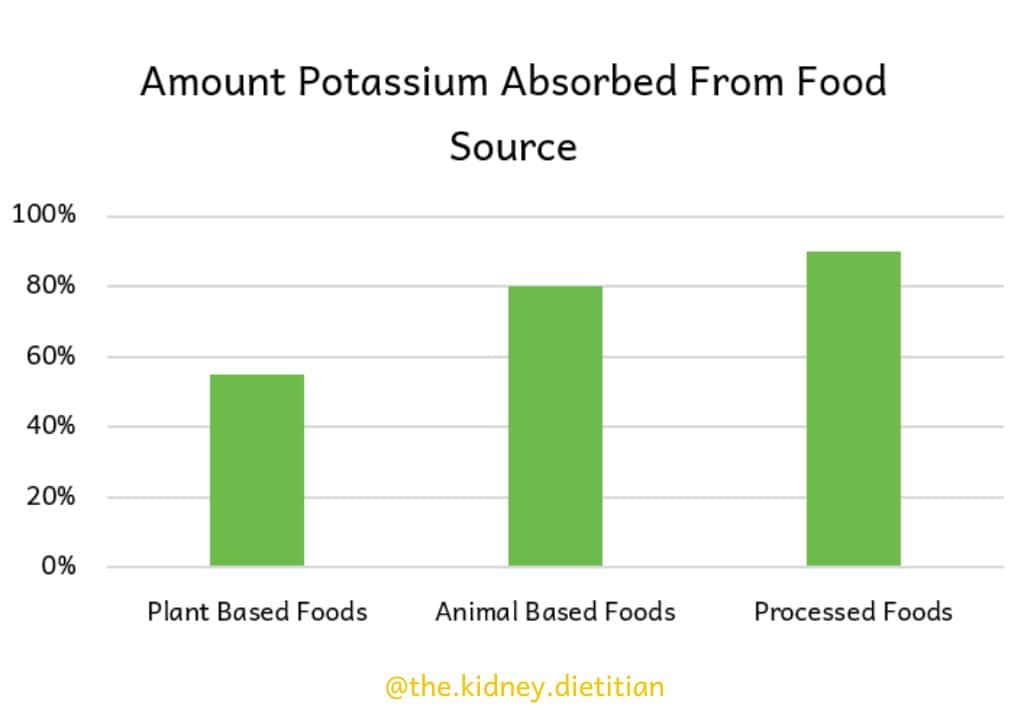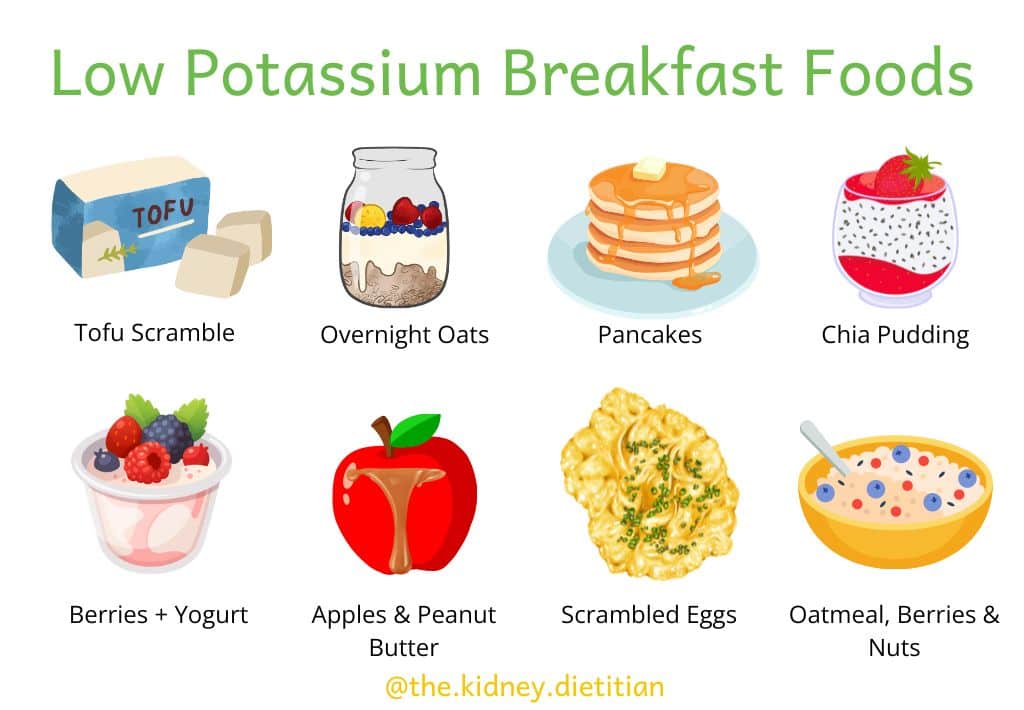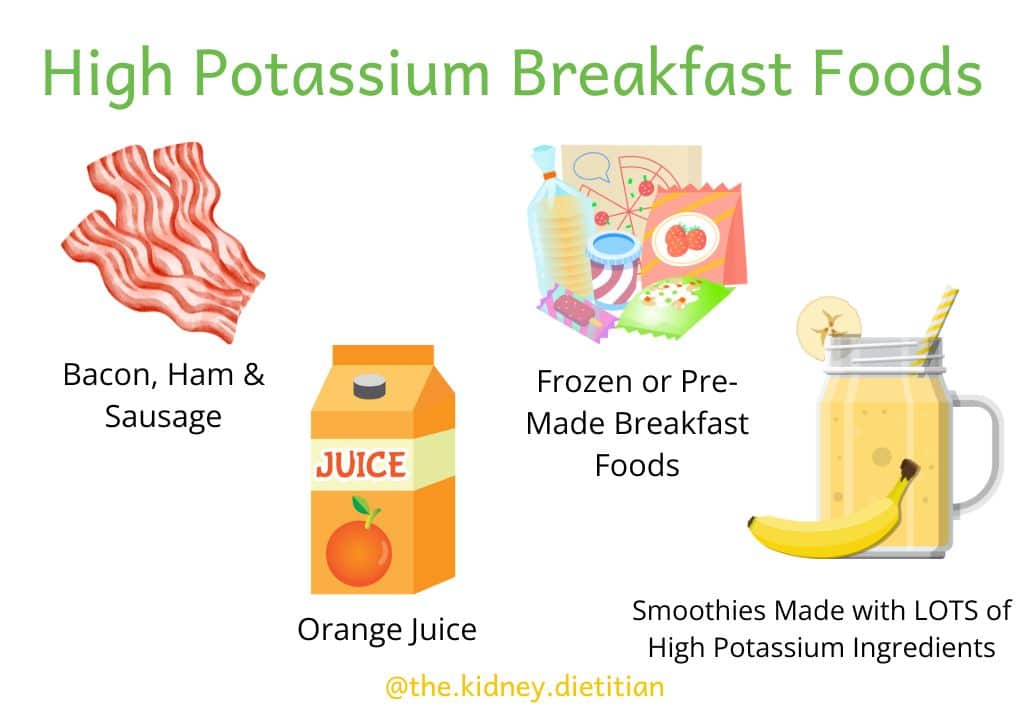Planning out healthy meals for kidney disease can be daunting. It can feel like all your usual foods, especially breakfast foods, are on the “bad” high potassium list.
Never fear! This kidney dietitian is here to help you make sense of all of this, and recommend some low potassium breakfast foods to protect your kidneys!
*Please note that this post contains clearly identified affiliate links. If you click on these links and choose to make a purchase, I may receive a commission (at no cost to you).
Breakfast & Kidney Health
Breakfast is the most important meal of the day, right!? I can’t say this is 100% true. I’d argue EVERY meal is the most important – but maybe that is just because I love eating! 😉
Joking aside, breakfast is very important for people with kidney disease. Many people have both kidney disease and diabetes. Even if you don’t have diabetes, controlling blood sugar is key to kidney health. High blood sugar can damage kidneys.
Nutritionally, one of the most important things you can do to control blood sugar is eat many, small meals throughout the day. This makes breakfast extra important to avoid going too long without eating after that LONG break overnight.
Potassium In Food & Kidney Disease
Historically, a low potassium diet was thought to be crucial for people with kidney disease. A “renal diet” limiting many individual nutrients like potassium, phosphorus, sodium and protein.
We know better now. There have been HUGE shifts in how we think about kidney nutrition in light of updated guidelines in 2020 from the National Kidney Foundation (1) and 2024 from KDIGO, a worldwide recommendation for kidney disease. (2)
Difference Between Diet & Blood Potassium
We know know that how much potassium you eat does NOT seem to impact blood potassium levels. (3) High blood potassium is a very common and serious issue for people with chronic kidney disease. But, a “low potassium diet” that limits many healthy fruits, vegetables and whole grains is NOT the best way to control blood potassium. (4)
A strict low potassium diet that limits fruits, vegetables and whole grains could inadvertently make things like constipation, acidosis or blood glucose levels WORSE. All of these things cause higher blood potassium levels. (4) It is crucial to work with your dietitian to understand what you can do to control potassium levels.
Both the National Kidney Foundation (1) & worldwide guidelines (2) now stress the importance of eating more plant foods – ironically many of the exact same foods we used to tell people to avoid for kidney disease!
Potassium in Fruits, Vegetables & Whole Grains
How is potassium in fruits, vegetables and whole grains safe for people with kidney disease? Firstly, these foods are packed with fiber. Fiber helps you poop, which is one of the main ways your body gets rid of potassium. Even though these foods are higher in potassium, your body will do a much better job getting rid of it with all of that fiber! (5)
Also, the potassium in these whole foods isn’t very well absorbed compared to potassium added to ultra processed foods. Only 50-60% of the potassium in plant-based foods is absorbed. Compare this to about 90% of potassium in processed foods! (2) This makes it safer for you to enjoy all of these healthy, kidney-friendly foods.
Lastly, and perhaps most importantly, diets that include LOTS of plant foods can help slow the progression of kidney disease and keep people off dialysis. (6) We certainly don’t want to make it harder for you to eat these healthy plant foods just because of the potassium!

Potassium Food Additives
On the flip side, potassium added to ultra processed foods can be a problem. Potassium in ultra processed foods is absorbed at a much higher rate than potassium found in fruits, vegetables and whole grains.
And, when potassium is added to food, this tends to increase the potassium by about 200-300%. (7)
To see if a food has potassium additives, look at the ingredients on the Nutrition Facts label. Avoid food products that contain any ingredient that contains the word “potassium”.
It makes a LOT more sense to avoid potassium additives in foods that likely aren’t going to help your kidneys to allow more room for potassium from healthy fruits, vegetables and whole grains. These foods absolutely WILL help your kidneys!
Ultimately, WHERE your potassium comes from is MUCH more important than HOW MUCH potassium you eat.
Who Needs Low Potassium Breakfast Foods?
All of this being said, who needs low potassium breakfast foods? IF you have kidney disease and have high blood potassium levels, it might be a good idea to focus on low potassium breakfast foods.
Remember, it is likely that improving your acid levels, constipation, blood sugar and reducing ultra-processed foods is a better way to control potassium than a low potassium diet that limits high potassium fruits and vegetables. Ask your kidney dietitian what is best for you!
No matter what you do, make sure your kidney-friendly diet is packed with fruits and vegetables!
Top 10 Low Potassium Breakfast Foods
Apples with Peanut Butter
365mg potassium per 1 large apple + 1 tablespoon peanut butter
A classic apple with a tablespoon or so of peanut butter is a perfect kidney-friendly low potassium breakfast food! The peanut butter gives a little plant-based protein and this meal is packed with fiber, vitamins and minerals!
Oatmeal with Berries & Nuts
390mg potassium per 1 1/2 cup prepared oatmeal + 1/2 cup blueberries + 1/4 cup walnuts
Soul-warming oatmeal is a perfect kidney-friendly food! Make it with water to limit phosphorus and protein, and top it with plenty of berries and a handful of your favorite nuts for some extra fiber and nutrition.
Scrambled Eggs
265mg potassium per 2 large scrambled eggs
Yep! Eggs can absolutely be a part of a kidney-friendly diet.
I love to add bits of whatever vegetable I have left in my fridge to sneak in an extra serving of vegetables. Bell peppers, onions and tomatoes are my favorite. Yes, tomatoes are ok (especially a few thrown in scrambled eggs) on a low potassium diet!

Berries with Yogurt
580mg potassium per 3/4 cup plain yogurt + 1/2 cup raspberries
Berries are the classic low potassium breakfast food! For good reason. Berries are very low potassium and PACKED with fiber, antioxidants and other kidney healthy vitamins.
Regular dairy yogurt is completely ok for many people with kidney disease. But, if you prefer or want a lower potassium option, plant-based yogurts tend to be lower in potassium. Be careful to avoid potassium additives in whatever plant-based yogurt you choose. I love Forager Project Cashew Yogurt* – which is free of both potassium and phosphorus additives.
Chia Seed Pudding
200mg potassium per 2 tablespoons chia seed + 1/2 cup almond milk + 1 teaspoon sweetener
Chia seeds are a phenomenal plant based source of protein and fiber. Two tablespoons of chia seed has 4 grams of protein and 10 grams of fiber!
If you haven’t tried making your own chia pudding, you are missing out! It is so simple, delicious and fun! Experiment with your favorite flavors and add-ins. Here is a good recipe to get you started!
Veggie Omelet
425mg potassium per 2 eggs, 1 ounce cheese + 1/2 cup broccoli
Adding vegetables to egg scrambles or omelets is a great way to add some extra fiber, vitamins and minerals – which is always a win for a kidney-friendly diet!
Cold Cereal
80-200mg per 1 cup serving
Yep! There are some healthy, low potassium cereals perfect for a kidney-friendly diet! Some of my favorites are Kashi Autumn Wheat* and Quaker Oatmeal Squares*.

Check out my article all about low potassium cereal!
Top your cereal with a little milk and a piece of fruit and you are good to go!
Overnight Oats
400mg potassium per 1/3 cup oats, 1/2 cup plain yogurt + 1 teaspoon sweetener
Overnight oats are one of my favorite ways to get creative in the kitchen! Overnight oats are simply dry oatmeal mixed with milk or yogurt and topped with your favorite things! You can add cocoa for a chocolate creation, coconut and pineapple for some tropical flavors! You can even add some nuts or seeds for some extra fiber.
Here is a great low potassium overnight oats recipe to get you started!
Tofu Veggie Scramble
580mg potassium in this recipe
Yes, I know tofu is a sensitive topic for many. But I promise, tofu is a delicious, versatile addition to a kidney-friendly diet!
One of the common ways to use tofu is a breakfast scramble in place of eggs for a plant-based option. This recipe calls for lots of tasty low potassium vegetables such as zucchini and onion mixed in with tofu. I promise, it is delicous!
Homemade Pancakes or Waffles
Who doesn’t love pancakes? If done right, pancakes and waffles can be a wonderful low potassium breakfast food!
The biggest kidney-friendly concern with pancakes or waffles is the sodium. They are usually made with baking powder or baking soda, which adds quite a bit of salt! Check out my low sodium pancake recipe for pancakes with a fraction of the salt.
Top your pancakes with your favorite low potassium fruit like strawberries, apples or peaches. YUM!
High Potassium Breakfast Foods to Limit
There are some breakfast foods that pack quite the potassium load. If you have kidney disease, especially if you have high blood potassium levels, limit these high potassium breakfast foods.

Bacon, Ham & Sausage
Processed meats are common at breakfast. Unfortunately, not only are these packed with sodium, they also tend to have potassium food additives. They are also laden with phosphorus food additives.
Limit these foods for a special occasion!
Orange Juice
Although juice is packed with wonderful vitamins and minerals, it lacks that wonderful fiber whole fruit has. It is also easy to have a pretty large portion of juice, which does add a lot of sugar without the fiber to help reduce spikes in blood sugar. Yes, even 100% juice.
Orange juice is especially high in potassium coming in at 335mg potassium per 6 fluid ounces. Compare this to apple juice with only 180mg potassium.
Check out my article on the best juice for kidney disease!
Frozen or Pre-Made Breakfast Foods
Frozen or refrigerated breakfast burritos, egg dishes and scrambles are likely very high in sodium – and likely have potassium in them too.
Whenever possible, it is best to make your own food at home to help control sodium – and avoid those potassium food additives!
Realistically, convenience foods are handy and inevitably come into our diet sometimes. When they do, always read the ingredient list to check for potassium ingredients and try to find options without them.
Smoothies Made with LOTS of High Potassium Ingredients
Smoothies are a possible high potassium breakfast food. Many of the traditional ingredients in smoothies are very high in potassium. Some common high potassium ingredients are:
- Banana
- Spinach
- Mango
- Coconut Water
There is nothing inherently wrong with any of these ingredients. However, when they are combined, or eaten in very large amounts in a single smoothie, this could too much potassium for some people with kidney disease. As always, ask you dietitian what is best for you!
A Healthy Diet for Kidney Disease
The MOST important thing to remember about a kidney-friendly and a low potassium diet is that it is different for every single person. Nutrition is different based on your stage of kidney disease, labs, other medical history, current eating habits and food preferences!
It is crucial to meet with a kidney dietitian to understand what diet is right for you! It is NEVER too early to meet with a dietitian. In fact, the earlier you meet with a dietitian, the more impact they can have on your kidney health! (g)
Happy Eating!
Melanie
- The Renal Warrior Project. Join Now
- Source: https://www.thekidneydietitian.org/low-potassium-breakfast-foods/
